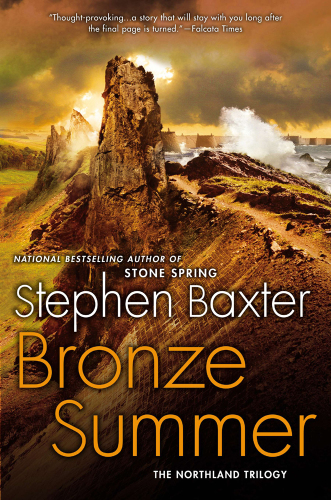
Bronze Summer
Northland Trilogy, Book 2
کتاب های مرتبط
- اطلاعات
- نقد و بررسی
- دیدگاه کاربران
نقد و بررسی

September 10, 2012
Baxter’s underwhelming follow-up to Stone Spring technically succeeds in its overarching goal—showing the effect on the prehistoric world of creating a huge wall to protect the bed of the future North Sea from being flooded—but is hampered by a large, uninteresting cast and the banality and bleakness of the prehistoric societies. When Northlander Milaqa’s mother is murdered, Milaqa’s uncle Teel reveals that he’s a member of a secret society, and he insists that Milaqa work with them to solve the crime. Meanwhile, rogue Qirum, busy taking advantage of the opportunities in postwar Troy, meets former queen Kilushepa, and they hatch a plan to bring them both into power. Baxter mixes some engaging intrigue and espionage into his ancient world, but too often focuses almost fetishistically on brutality, with a barrage of descriptions of violence and rape (targeting children as often as adults) that render the world more bromidic than horrifying and undercut any power in the ending.

Starred review from October 15, 2012
The saga of Northland, a sophisticated hunter-gatherer civilization thriving behind a vast wall shielding it from the invading waters of the North Sea (Stone Spring, 2011), continues in a tumultuous alternate 1159 B.C. Drought and famine grip Europe and Asia. The eruption of an Icelandic volcano spreads ash through the atmosphere, chilling the air and further damaging the ecosphere. The Northland's trade with the Americas has gained them both maize and the potato and thus may hold the key to staving off starvation. A deposed but extraordinarily charismatic Hatti (Hittite) queen and her lover (actually owner), an ambitious Trojan scavenger, seek access to these foodstuffs, while political infighting in Etxelur (the region closest to the Wall) about whether to grant such access has already led to murder. This is worldbuilding at its very finest. Baxter's research of ancient cultures and natural history (detailed in a helpful afterword) and his extrapolation of what Northland societal structure might be like create an utterly real-seeming physical, political and economic landscape. His understanding of the human heart and its frailties paint convincing and powerful character portraits, particularly when exploring the various ways in which people will behave when pushed to the absolute end of their emotional endurance. Gripping, well researched and sharply intelligent.
COPYRIGHT(2012) Kirkus Reviews, ALL RIGHTS RESERVED.

























دیدگاه کاربران